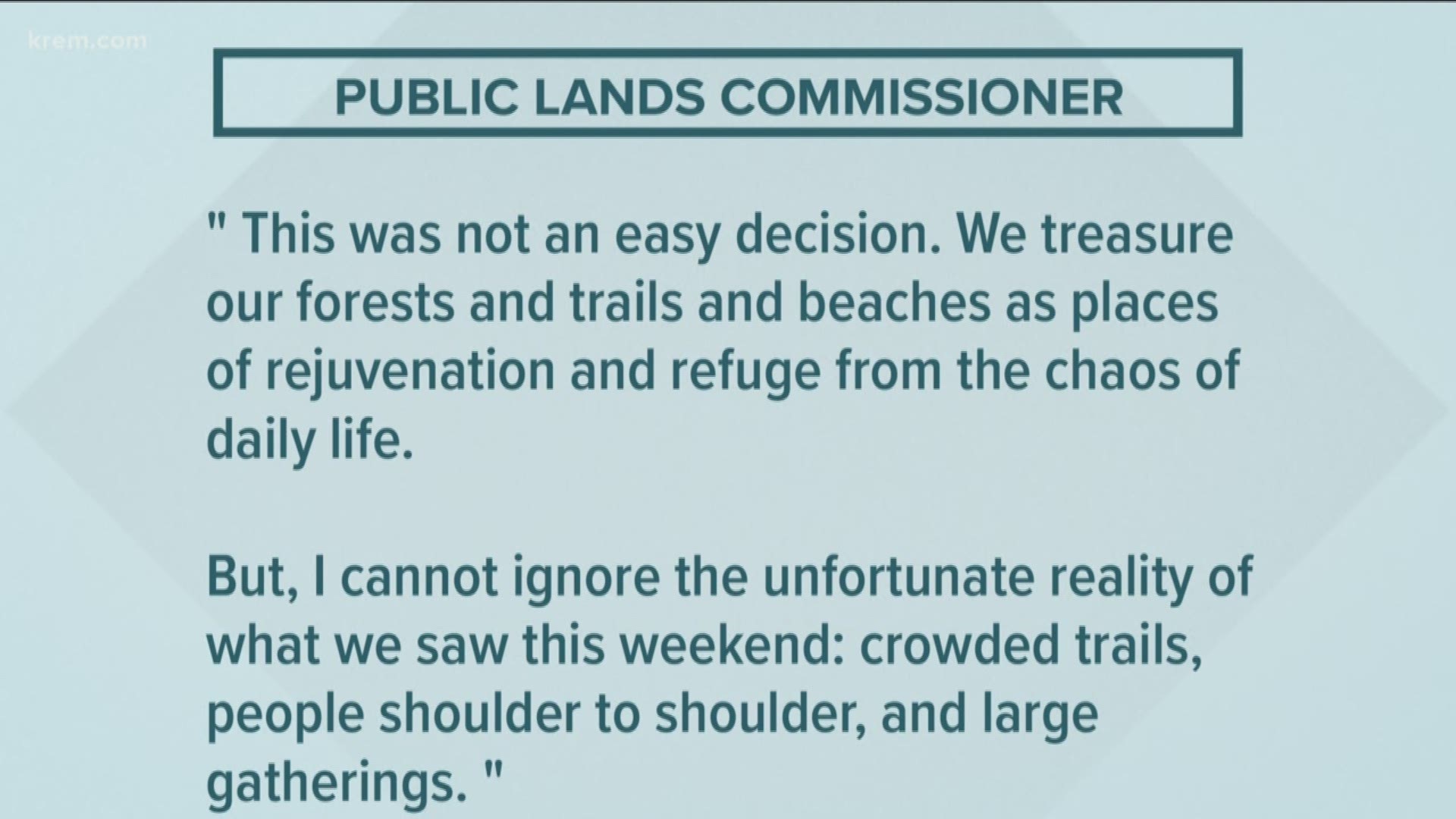SPOKANE, Wash. — All of Washington's state-run parks, wildlife areas, water access areas, and DNR-managed land are closed for at least two weeks following Gov. Jay Inslee's announcement of a "stay-at-home" order.
Entrance gates and facilities will be closed and on-site public services will be suspended. Essential staff will be present to preserve and protect resources.
The Washington Department of Fish and Wildlife (WDFW) also announced the closure of recreational fishing and shellfishing statewide. The closures will begin at midnight on Wednesday, March 25 and last until at least 5 p.m. on April 8, 2020.
WDFW will re-evaluate on April 6 whether the closures may need to be extended.
“We’ve seen an uptick in outdoor recreation at some locations in recent weeks as people have looked for ways to get outside,” said WDFW Fish Program Director Kelly Cunningham. “We’ve had reports of crowded boat ramps and busy fishing on some rivers, which runs counter to the governor’s direction to stay home and practice social distancing.”
The lowland lakes opening day for trout remains scheduled for April 25, but will be evaluated depending on whether the governor’s “Stay Home, Stay Healthy” order will be extended.
Camping and other overnight accommodations on state-managed recreation lands will remain closed through April 30.
The Washington State Department of Natural Resources is closing all public lands that it manages through at least April 8. DNR manages nearly 6 million acres.
Commissioner of Public Lands Hilary Franz, who leads DNR, issued a statement on the decision:
"This was not an easy decision. We treasure our forests and trails and beaches as places of rejuvenation and refuge from the chaos of daily life. But, I cannot ignore the unfortunate reality of what we saw this weekend: crowded trails, people shoulder to shoulder, and large gatherings. This behavior undercuts the sacrifices that Washingtonians of all means and ability are making in order to adhere to social distancing. And it undercuts the heroic efforts of our doctors, nurses, and first responders who risk their lives each day responding to this unrelenting epidemic.
This behavior also makes clear that, while we have taken drastic measures, we have not done enough when it comes to closing areas where large crowds gather and communicating the importance of staying at home and avoiding physical contact with others.
The disruptions we are experiencing are difficult and challenging – and unprecedented in our lifetimes. But they are necessary. We must bend the curve. And if we all do our part, these temporary disruptions will save countless lives.”
The Washington State Parks and Recreation Commission manages more than 100 state parks and properties totaling approximately 120,000 acres.
The Washington Department of Fish and Wildlife manages about 1 million acres of land, 33 wildlife areas, and nearly 500 water access sites.
Schools, public events and dine-in restaurants already have been closed or canceled for at least a week. A ban on gatherings larger than 250 drove many churches to cancel in-person services.
RELATED: Washington restaurants, bars, and other venues closed to customers amid coronavirus outbreak
Spokane County recently announced the closure of all playgrounds to stop the spread of COVID-19. City and county golf courses are also closed, while city and county parks remain open for now.
Inslee's "stay-at-home" order is in effect for residents and businesses, and will last at least two weeks.
People may still run imperative errands and go outside, such as walks and gardening, while maintaining a safe social distance from others. Only essential businesses may remain open to the public.
Grocery stores, pharmacies, gas stations and restaurants offering take-out are among the essential businesses that will be allowed to remain open. State officials urged residents to not rush these businesses and to not hoard supplies.
The state has posted a list of types of "essential industries," which includes the workforce in healthcare, emergency services, grocery workers, to-go restaurants, postal and shipping workers, customer service for banks and many more.

